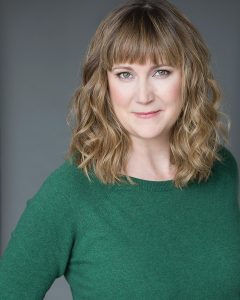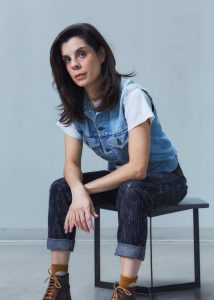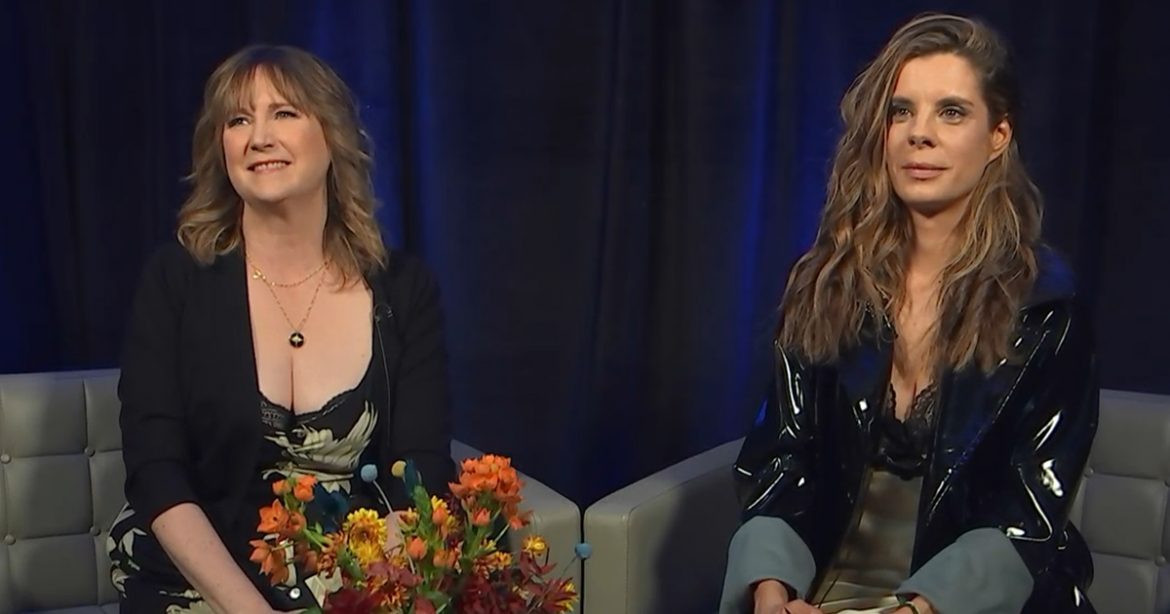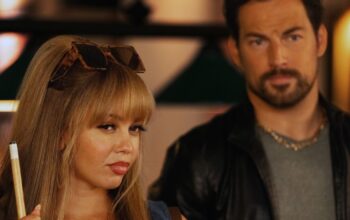Thursday, during the CBC announcement of its upcoming season, we were excited to see that two of the Baroness Von Sketch alumni, Jennifer Whalen and Pretty Hard Cases’ Meredith MacNeill, will be producing, writing, and headlining Small Achievable Goals, a new half-hour series landing next winter that will follow two new colleagues who are paired up just as they hit menopause, forcing them to navigate “workplace challenges and office politics, dating and relationship drama, and some serious health concerns.” I spoke with Whalen and MacNeill about the series during the press day.
The series rose from Whelan’s own experience, menopausing during the pandemic. “I started going through menopause and realizing there’s a reason why nobody talks about it and looks at it, because the way our society portrays it is so bleak. And so when I started to go through it myself, some of it was quite funny. And I thought, ‘I would like to laugh about this. And I think other people would, too,'” she shares.
“Meredith and I had been talking for a long time about wanting to do a workplace comedy together. Obviously we love working together, and that was the genesis. The title came around because I was just having one of those days in the pandemic. I was so overwhelmed by the state of the world by what was going on with me and my body.”

“I was sitting on the couch with my husband, saying to him, ‘I just don’t know where to start. It’s so big. I just don’t feel good, and I don’t feel like myself and I need to get back to that. I don’t know how to do it, it’s too big. Maybe if I broke it down into little pieces or small achievable goals, and he said, ‘Babe, that’s a something.'”
“At this point, I thought, ‘You’re right. It’s a something.’ And so I wrote it on a little eight by five card that I had and put it on my desk. And that’s how I came to the title. The overarching ethos of menopause is that it is too much. It’s too overwhelming. So you kind of gotta deal with one thing at a time.”
MacNeil shares that their Baroness history informed their approach here to incorporating personal truths into the show, to a point. “Being on Baroness for so long, I was so fortunate to work with people that wanted to tell the truth all the time by sharing certain experiences, and what that does. When you put that out into the world, that is what really vibrates with people. This telling of truth, whether it be a collective truth or your personal truth,” she explains.
“And I think creating the character of Krris and creating the show with Jen, I was sharing some things and then as it started to roll out, it started to be more. There is something about perimenopause and menopause that you deny a little bit, that you don’t want to admit, because, in another way, society isn’t letting you admit it and doctors are slightly gaslighting you.”
“As time went on and we started to create it, I started to share more and more of my personal experience of what it was like.”
“It’s hard like going through it and writing it, especially with our years of Baroness, to not [look at each experience as], ‘Oh gosh, I think this is gonna be a thing.’ There’s always a fear, though, because your personal experience isn’t gonna be someone else’s. But I know that if you tell the truth around that, that will sort of vibrate.”
Whelan has found that women in the same situation are eager to discuss menopause and perimenopause, and that’s been a terrific validation of the need for such an open, and comedic, dialogue. “I was at the menopause doctor the other day and this woman in the waiting room and I struck up a conversation and she started telling me about her struggles with her one incredibly stinky armpit. I, too, have one incredibly stinky armpit that I never had before. And it was one of those signs from the universe that we are doing the right thing,” she says.
“We are on the right track. She didn’t know who I was or what I was doing. We were just two strangers talking. And then when she was telling me all the crazy things she’s done, which by the way, some of them, I was like, ‘Okay, I gotta try that.’ And all the crazy things I’ve done, and the Internet things. And so it was just like we were each other’s best resource. I thought, ‘Okay, this is something. This is a place to be.”
During the CBC upfront event, MacNeill riffed on some of her own experiences a la “Two Truths and a Lie,” and says that the team around the show have been very collaborative about exploring the vast array of experience from the awkward and uncomfortable to the mortifying to the hysterical.
“For us, it’s fair game, but we work with producers and broadcasters. so it’s a collective agreement of what goes in. But I will say the CBC have always been extremely, incredibly supportive of the messaging that Jen and I have done over the years,” she points out.
“We are taking big swings in this show and we’re feeling the support.”
“I also feel like, ‘What have we got to lose?’ Nobody’s talking about it. Let’s talk about everything. Because also I feel like we are women of a certain age. We’re mature. We have some life things. I’m not a 16-year-old who’s embarrassed because I wore the wrong shirt to school. I’ve got some backstory to me and I’ve been through some things,” adds Whelan.
“I feel very comfortable talking about this because we need to. We’re not gonna move ahead unless we do. The only thing I wouldn’t talk about is if it actually was going to hurt somebody. I don’t wanna hurt anybody, but I’m very open about talking about any embarrassing thing that has happened to me.”

“We’ve got nothing to hide. We are coming out saying, ‘I’m in perimenopause, Jen’s in menopause. We’re doing a comedy about it, so who gives a . We might as well just say it. It has some intense heartfelt moments that I think are truer and what the reality is. There’s some big stuff that happens. It’s like a huge thing,” shares MacNeill.
“When it happened to me, I felt so wholly unprepared for it. If I knew what to expect and if it wasn’t [verboten]. Can you imagine not telling teenagers about puberty at all, and ‘Don’t talk about it. I don’t wanna know what’s happening.’ That’s kind of what we’re doing with this. It is like a second puberty, but you’re not supposed to talk about it. You’re not supposed to acknowledge that it’s happening. You’re just supposed to do what you do, layer your clothes, try and figure out some herbs and just be like, ‘Yeah, it’s fine for 10 years.'”
“I think we’ve got a rage against that. I think society doesn’t get to say what that looks like. We get to say what that looks like.”
As they build out the season, MacNeill is planning to explore the deeper-seated reasons behind menopause having such a hidden, shameful stigma. “I think [about] being under the male gaze and the internal patriarchy of how women have all internalized the patriarchy and the sort of the shame that comes with it. I wouldn’t say I’m having fun or enjoying the theme, but I’m learning a lot about myself and my friends by really focusing in on how I view the world, how I’m even writing the show just being brought up under the patriarchy and then dealing with menopause and the gaze of it.”
“There is a ton of negativity around menopause. And I understand why, because it’s hard to go through. And in our DNA, it’s the caveman thing of fear and always looking at the negative. But also what I find culturally infuriating is that isn’t it convenient that menopause is considered only negative? It’s when women are at their strongest, their wisest, probably doing their best financially. And that we’re considered a write-off. As soon as you can’t procreate, you’re not talked about.”
“This whole thing about menopause that we’re consistently apologizing for or making fun of but getting into the internal patriarch of what menopause really is and how we talk about it, is really exciting for me.”
Whelan is excited to play a character who transforms from one shaped by that world view to someone who takes ownership of her experience. “She’s terrified of it and, and terrified of who she’ll become. And so her journey is a journey of transformation from something that she’s terrified of to how does it become a joyful thing for her and how does it become the best thing that ever happened to her,” she says.
“And so that’s what I’m looking at. I would like us to at least start talking about framing it differently. Why can’t this be a joyful time? Why can’t this be an amazing rite of passage? Why can’t there be a bunch of people with the uteruses waiting for you, saying ‘Hey, we’ve gone through it. We’re on the other side. It’s great.’ You know?”
The 10-episode first season of Small Achievable Goals premieres next winter on the CBC.
Photos courtesy of CBC.



